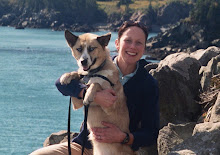
Two days later, we leave Ari at home and drive to Cheshire’s Victorian home. Greg is doing his best to be a good sport, but I can tell he’s not entirely enthusiastic.
“Only one,” he reminds me as we ring the doorbell. “We only have room for one more animal.”
Cheshire leads us upstairs into feral cat land. As we walk up the stairs, she warns us that, although they have learned to trust her, the cats will not transfer that trust to other humans. At least not at first.
“These kitten-cats were born feral, and they lived on their own outdoors for five months. That’s about as long as you can go and still hope for domestication,” she says.
We count back the months since they were rescued and brought to Cheshire.
“The cats were born in September?” I ask.
Cheshire nods.
“So they spent the winter outside?”
She nods again.
“How on earth did they survive?”
“I have no idea. But these are tough little animals.”
“I have no idea. But these are tough little animals.”
Not that you’d know it at first meeting. The four kittens launch elaborate crisis drill as soon as we enter the room. Each flies off her perch and scatters about the room, as if moving towards her appointed place of cover. The three humans move their heads back and forth quickly, trying to keep track of the lightening speed and precision movement.
“Well,” says Cheshire with a deep breath. “Here they are.”
She introduces us to the litter. Before I can say anything, Greg turns to Cheshire.
“I really think they ought to at least stay in pairs, don’t you?”
She smiles in agreement. I blink, looking for the husband who accompanied me to this house.
Greg continues. “I mean, I think it’s the right thing to do. For the cats. I wouldn’t want to separate Mouse from the only family she has.”
I remain dumbstruck. And pleased.
Cheshire quietly steps away from the room, leaving the two of us with four terrified cats. I sit down on an overturned chair.
“Two cats?” I smile.
Greg looks sheepish. “They seem so scared,” he says. “I think they need one another.”
But how do we choose? We look at each one, delightful in her own way. We can’t make this decision for them. I go downstairs and find Cheshire, reading a book of philosophy in the living room.
“We need your help,” I say. “Who would be the best choice for Mouse?”
She comes upstairs and surveys the room. “They’re all great,” she says. “But I when I hear scampering up here, I think it’s coming from Mouse and Leila Tov. I can’t confirm it, but I think they’re playmates.” She pauses. “I’m not going to lie to you, though. Leila Tov has come the least far in terms of socialization. I don’t know that she’s ever going to become really domesticated.”
That doesn’t bother me too much. Leila Tov is a mirror image of her sister: lean and black and mysterious in her reticence. I like the contrast. And hopefully we’ll have Mouse to cuddle someday. “Do you think Leila Tov will be hard to place with another family?”
“I do. I’ve had the most inquiries about Cora, and a few people have visited Mavis and Mouse. But none so far for Leila Tov.
That settles it for me. I look to Greg. “Can she be the one?”
He agrees.
Getting the two cats into a carrier is a comedy of errors for the five of us. Cheshire tries to extricate Mouse from her perch on the windowsill, but Mouse has laid root. Patiently, Cheshire tries to remove each of Mouse’s barbed claws from the screen. Her paws are enormous, with several extra thumbs on each hand. She looks like Mickey Mouse with his big, white gloves. Or, even better, like a two-handed catcher for the White Sox.
Leila Tov, who is much more graceful and lacks the extra digits, is no less of a challenge when it comes to getting her in the carrier. Each time we pour one cat in, the other escapes. By the time they are both incarcerated, the three humans are exhausted.
We shake Cheshire’s hand and promise to stay in touch. She follows us to the car with reminders about helping the cats get adjusted to their new house.
“And don’t worry if they don’t eat or use the litterbox. It could take days. When their brother was adopted, he didn’t eat or pee for over a week.”
This does not sound promising.
Greg and I drive home in anxious silence. We have made a mostly impetuous decision, and one for which we have little experience or qualification. As for the juvenile dog waiting anxiously at home, we can only hope she associates our new cargo with Cam and not the lurking feral cats in our driveway. Cheshire’s constant reminders that we could return the kitten-cats provides just enough comfort to persuade us to keep driving.
Once home, we lug the carrier into my back office, where we set up food and water, a litter box, and what we hope will be an appealing cat nest of flannel sheets and thick towels. The set-up looks very much like it did for Cam’s final hours. Maybe this will help chase away some of those residual ghosts.
The two cats have stuffed themselves into the back corner of the carrier, intertwined in fear. Their tiny dark faces point outwards, revealing only four wide green eyes. We open the carrier door and peer in. They try—unsuccessfully—to wedge themselves further back in the carrier. This is going to take a while.
Greg and I leave them alone in the room and shut the door behind us. We take Ari for a very long walk, hoping the quiet house will give the kitten-cats time to adjust. When we return an hour or two later, the cats have disappeared from carrier. I crouch under the futon. No cats. I look behind the bookcase. No cats. Chair, desk, endtable. No cats. Are they Houdinis? Can they, Harry Potter-like, disparate into thin air? I am intrigued by this idea, in spite of its obvious unlikeliness. And I have to admit that I’m a little disappointed when I find the two sisters crouched in the microscopic space created between our T.V. armoire and the far corner of the room. I look through the small wedge of space. The two dark faces turn in my direction, eyes still wide. I coo and cluck. They do not respond.
This continues for the next day or two, as Greg and I alternately pop into the room every few hours to check on the lack of progress made by the cats. On the third day, I contact Cheshire to see if she has any advice.
“You have to minimize their hiding places,” she counsels. “Make it harder for them to seek refuge completely away from you. But don’t be aggressive in approaching them, either. They should still be able to dictate the terms.”
Greg and I puzzle out how to make this work in the back room. Eventually, we decide to pull out the armoire from the corner, thereby creating a bigger space—one that, eventually, could accommodate a human appendage. We do this in quick bursts into the room—just long enough for us to remind the cats that we share this new house with them, but not long enough for Ari to realize something’s up.
Miraculously, this plan works. Although the cats, distraught that their place of residence has been compromised, retreat to the area behind the futon. On the fourth day, I see a flash of black tail scurry back as I open the door. At least they’re wandering in our absence. Around midnight on the fifth night, we hear a mad soccer match taking place downstairs. The rumbling of pouncing cats stirs Ari, who trots over to Greg’s office where she can stand, directly over the back room, with one ear cocked and her eyes as wide as the cats’. Something’s down there! She seems to say. She paws at the carpet and looks at us more intently. Hey, guys. Something’s DOWN THERE!! We tell her she has new friends but that it will be awhile before they are formally introduced. This clearly infuriates the puppy, who spends the remainder of the soccer match lying sphinx-like, following the sound with her wolfie ears and pouncing on the floor from time to time. Each time we make eye contact, she gives us a dirty look: Why on earth are we up here, when something’s playing DOWN THERE?!?! Her expression suggests something between contempt and pity. Humans clearly don’t get it.
The next day, Greg and I decide that our presence isn’t going to make a great deal of difference in the back room. And, to be honest, we’ve begun to miss our T.V. We take the pup with us: the three animals are going to have to get to know one another eventually. For the first hour or two, Ari seems to have forgotten that we have company in the room. Gradually, though, she puts two and two together: Litter box and unfamiliar food, yes that’s very interesting. Humans unnaturally interested in the wall behind the futon. Most peculiar. And what is that? That faint odor . . . it seems almost familiar to me. . . vaguely feline, I dare say. Wait. I think I’ve got it. We have new cats!
At the risk of cliché, I swear I can see a tiny compact fluorescent illuminate somewhere just above Ari’s skull. I turn to Greg.
“I think she’s figured it out.” This is both a confirmation and a warning.
A moment later, we watch with trepidation as Ari trots to the side of the futon and inserts her long snout, breathing deeply. Sure enough, that’s a cat smell. She jostles and dances, trying to get a good look. Greg and I forget about our movie and turn to the back of the couch. The two dark faces dart from us to the pup, who is now whining and yowling softly, desperate to get their attention. We’ve gone too far to turn back—the cats are going to have to meet this canine gadfly.
Forty minutes later, Ari is no closer to wooing the cats. Tired from her vocalization and constant tap dance, she retreats and lies down expectantly. She sighs heavily. We all wait. And then, a few minutes later, a clownish little face emerges from behind the futon. Mouse looks around once or twice, and her compact body follows. She steps gingerly in the direction of Ari. They both sniff the air. Ari looks restless. I say her name in a long, slow tone of warning. But it’s needless. She’s riveted to the floor, waiting to see what Mouse will do next. Mouse responds by taking a quick lap around the room, staying low and nervous on her haunches. Ari lets her explore, craning her neck owl-like to keep this new cat in view. Mouse completes the circle and returns near Ari. The two sniff the air again, then Mouse retreats underneath the futon, presumably to report back to her more reticent sister.
Over the next week, these brief encounters continue—each time prompted by the urgings of our very social dog. She has once again become our ambassador, this time an emissary representing both the human and feral world. Without her, we make little progress communicating our benevolence to these frightened, feral sisters. Somehow, though, she’s able to convey all this and more. Given how notoriously difficult it is to acclimate feral cats to a new social environment, I’m both impressed and intrigued by Ari’s success. Is it her penchant for caninaturalism? Her transcendentalism? The fact that she was semi-feral for her early months?
Of course, that last designation is mine, and I doubt many wildlife biologists would share it.
When they use the word feral, they generally mean those animals who have returned to a wild state after once being domestic. Does this include Ari? Probably not. Her unsupervised life in the shelter was more like Peter Pan’s Island of Lost Boys. I pose this notion to a small group of my science colleagues if this counts. They look skeptical. I ask how closely they guard their definitions.
My colleague, Jim Chacko, an expert in fisheries and aquaculture, admits to a certain capriciousness in scientific identification. He says this low and quietly, as if he might be excommunicated for this admission.
“I cannot say why, but people in my field have started calling all wild fish ‘feral,’” he offers.
I tell him this conjures images of rogue salmon wearing punk clothing or little goldfish throwing satchels over their shoulders and hitting the open road.
“Goldfish don’t have shoulders,” he corrects. He doesn’t deign to comment on the idea of fishy couture. “And I mean fish already in the wild.”
“So what do you call fish that were once domestic and are now wild?”
“Escapees.”
You have to hand it to ichthyologists. They’re efficient with their language, if nothing else.


















2 comments:
What eye-opening fun! This chapter, with its witty and entertaining account of this young couple and their couple of young cats, probes the fundamental and fundamentally difficult distinction of wild and domestic. It seems Henry David Thoreau was on a similar tack at some point as he trekked the Maine woods or settled down beside Walden Pond. It's even more fascinating to see Ms. Miles--and her Ari--show us how we might test such abstract theories of nature without even venturing beyond our own front door. These ideas are in play all the time, right around us, if only we took the time to stop, look, and listen. Here's to the marvelous pets and the diligent writers who remind us to do just that!
Transcendentalism, eh? I can't wait to comb through the posts and find that.
I threw a party last night, and cats were one of the primary topics of discussion due to my friends' recent spontaneous adoption of Sister and Scrappy (temporary names, but adorable nonetheless!). It was generally agreed that these things almost ALWAYS happen spontaneously (recklessly? hastily? throwing caution pell-mell to the wind?). So you are not alone.
Wishing you good luck and waiting eagerly to hear how things progress...
Post a Comment